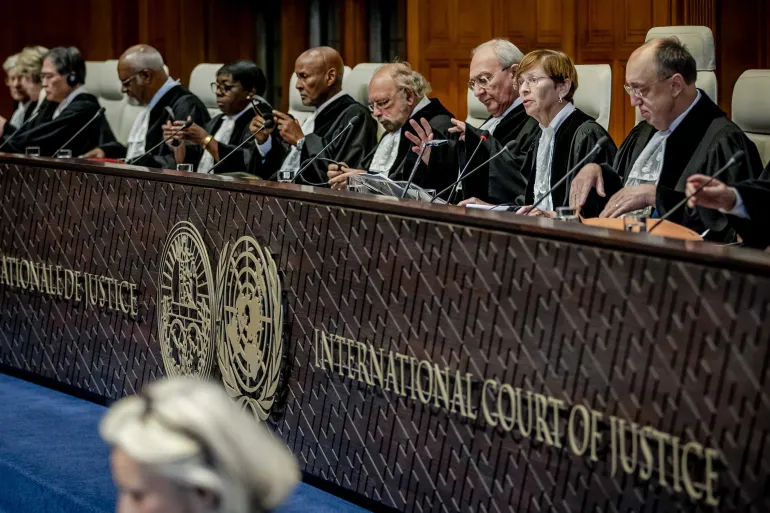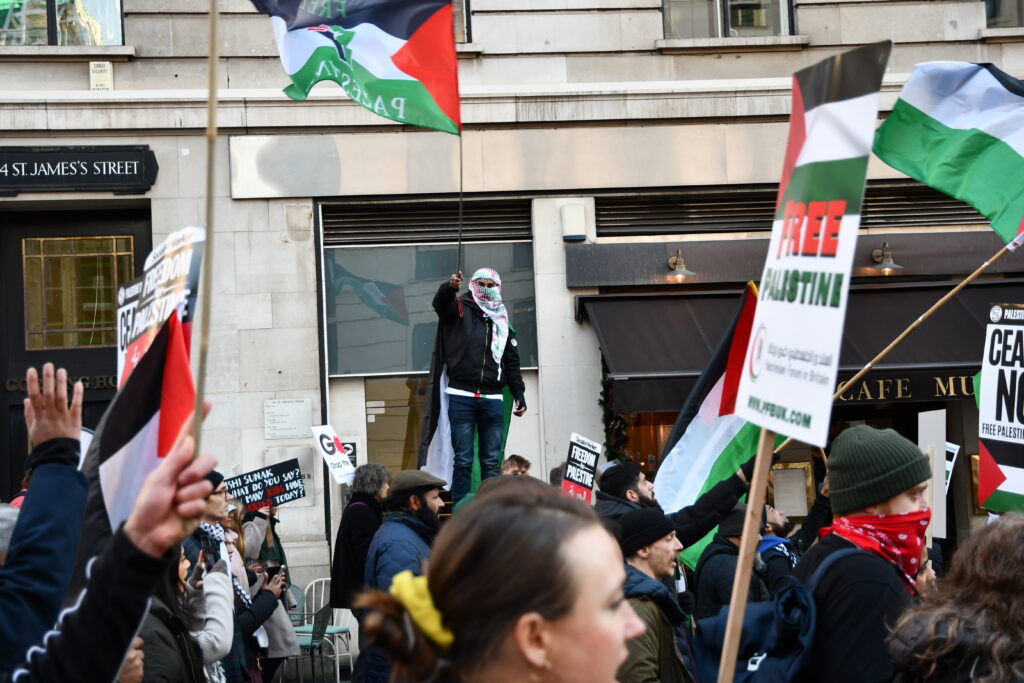Written by: Akanksha Pandey, Senior Editor and Abigail Keyla, Staff Writer
Eighty-three days into the Israel-Hamas war, the Republic of South Africa has filed a genocide case against Israel for the atrocities they are committing in Gaza to the International Court of Justice (ICJ), the highest court of the United Nations. Thus begins a long road, where South Africa must prove to the Court that Israel is perpetrating genocide, failing to prevent genocide, or not punishing genocidal acts – a process which may take months or even years.
The Republic of South Africa filed the Prevention of Genocide case against Israel on 29 December 2023. The ICJ held public hearings at the Peace Palace in The Hague on 11 and 12 January over the proceedings instituted by South Africa. As of 6 February, the recorded death toll in Gaza stands at more than 27,500 deaths, and South Africa claims that Israel has breached the 1948 Genocide Convention. The legal team arguing on behalf of South Africa requested that the ICJ issue provisional emergency measures to stop the continuing onslaught on the Gaza Strip.
Israel argued that Hamas’s attack on the surrounding villages and army posts in the south of Israel along with taking hostages on 7 October is what kick-started the Gaza war and, therefore, Israel has the right to self-defence under international law. Neil Sammonds, senior campaigner on Palestine at the humanitarian organisation War on Want, told Al Jazeera: “Of course, both South Africa and human rights organisations like us condemn the killing of civilians and taking of hostages [by Hamas]… But this in no way justifies the response from Israel. As an occupying force, Israel does not have the right to self-defence – this argument does not hold water.”
In 2003, in a case regarding Israel’s construction of a partition wall in the occupied West Bank, the ICJ ruled that an occupying state could not claim the right to self-defence. Although Israel has not recognised itself to be an occupying state since its disengagement from Gaza in 2006, the UN and various human rights organisations have rejected this claim. The ICJ ruling acts as a precedence that weakens Israel’s “right to self-defence” argument.
Responding to allegations of mass killings of Palestinian civilians, Israel’s legal team claimed that Hamas was using civilians as human shields and that Israeli troops were the ones trying to “minimise” civilian harm. This claim holds little weight. There are many evidenced cases of Palestinians being shot while attempting to evacuate, unarmed. In December 2023, Israel killed three of its own citizens who appeared to have escaped Hamas captivity and waved white flags – a symbol of surrender and non-violence. Israel conveniently swept these murders under the rug, mere “mistakes” made by soldiers under pressure.
Israel claimed that South Africa had failed to communicate with Israel before filing a case to the ICJ, which is required according to the Court’s rules. Israel’s legal representative, Professor Malcolm Shaw claimed that South Africa did not give Israel enough time to respond to the accusation. Israel claimed that South Africa said that there was “no point” in having a discussion, questioning whether the case should have come before the court at all. This undermines the court’s power to adjudicate. South Africa’s lack of response to Israel’s claims strengthens Israel’s defence.

Rejecting the allegations that Israel is blockading water, food, and other critical supplies from Gaza, Israel’s representative claimed that “seventy trucks” of food aid were allowed into Gaza before the war and that the number has gone up to “106 trucks” since 12 January. According to the UN, a significantly large number of trucks were entering Gaza daily before the war, after which Israel banned all aid and blocked all entries. Around 200 trucks were allowed to enter Gaza daily during the brief truce period between Israel and Hamas, but after that, fewer than 100 trucks have been able to pass the borders. Israel’s Acting Director of the International Justice Division, Galit Raguan, argued that Hamas seized aid supplies for its fighters. Israel has also denied targeting hospitals. According to Raguan, Israel warns the Palestinian population if there is an incoming bombardment through phone calls and leaflets. However, Palestinian journalists have constantly been reporting that surprise bombings of the Gaza Strip often occur.
Ultimately, analyses by humanitarian experts (such as Neil Sammonds from War on Want and Akshaya Kumar at Human Rights Watch) and the UN itself debunk all of Israel’s counter-arguments, rendering their legal position extremely weak and superficial.
By filing this case, South Africa did what other countries have not been able to do : hold Israel accountable for their actions under international law. The bond of solidarity between South African and Palestinian peoples stretches as far back as Nelson Mandela’s career and has since been strengthened by their continued resistance to modern colonialism.
Having a pained history of colonial violence and liberation struggles themselves, it comes as no surprise that the memories of South Africa’s past have influenced their present decisions and add to the significance of the proceedings. The act of a nation from the Global South coming forward in defence of Palestine is hugely symbolic in itself. It challenges the traditional North-Western powers that dominate over underrepresented voices, through an internationally recognised body.
Other colonised nations have since expressed their solidarity with Palestine and have called for an immediate ceasefire. This culminated in a mass “walkout” during Israeli ambassador to the UN Gilad Erdan’s speech during the UN Security Council session on 23 January, led by Indonesia’s Foreign Minister, Retno Marsudi, and promptly followed by the delegations of other Arab nations.
On 26 January, the ICJ published their interim ruling on the case, which required Israel to prevent genocidal acts from happening again and to allow humanitarian aid to be sent to Gaza. Notably, there was no call for a ceasefire.
Following ICJ’s announcement, Israel’s prime minister, Benjamin Netanyahu, has rejected the ruling and announced they will continue their military operation to “defend itself”, according to Al Jazeera.
Israeli government spokesperson, Eylon Levy, stated that the ICJ’s ruling was meant to “remind Israel of what its obligations are under international law.” This means to submit to the 1948 Genocide Convention and allow international humanitarian aid to flow into Gaza – which Israel claims they are already doing.
Many debate the effectiveness of the ICJ’s decisions, and if they will have any effect on the ongoing war at all. The truth is this: ultimately the potency of ICJ rulings is weak, with the Court’s purpose being to “peacefully settle disputes between nations” The ICJ cannot prosecute individuals or nations for crimes, even those “of the utmost severity’. Though legally binding, countries may ignore the Court’s decisions, such as the ICJ’s order for Russia to halt their operations in Ukraine, which did not happen.
Combined with Israel’s nonchalance and outright denial of the Court’s ruling and of the concerns expressed by global nations, this seems to indicate that there will be little change in Israel’s current military operation in Gaza.
Nevertheless, international pressure is increasing, and it is only a matter of time before it backfires towards Israel. While the jury is still out on whether ICJ’s rulings will encourage a ceasefire in Gaza, South Africa’s courage is a monumental step toward justice for Palestinians and colonised nations across the globe.

